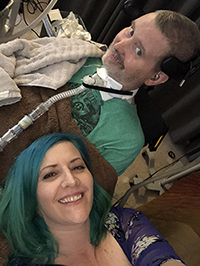Getting a diagnosis of ALS is devastating not only for the patient but for family and friends too. ALS doesn’t discriminate and it moves swiftly. As a caregiver it’s your job to take care of your patient. That’s a huge responsibility on top of the emotional toll ALS can take.
Life will change rapidly. It can get scary. My husband was diagnosed with ALS in 2011 so we’ve been dealing with ALS for several years now. At times it can be overwhelming but believe me when I say you are stronger than you think! Hopefully these tips can help caregivers who are new to the role.
Read about ALS, and understand that the timeline is one of the keys. ALS affects everyone in a different way. Everyone is different so instead of thinking of it as a timeline, think of more in terms of disease progression. It won’t be typical to say that a patient stops walking at five months or so. It just depends on the patient. Instead you’ll want to be ready to adapt to a decrease in mobility or ability.
Here are some tips from one caregiver to another.
Educate Yourself on the Disease (but don’t overdo it)
Review Your Current Insurance
Find an ALS Clinic
Apply for Medicare / Social Security Disability
Join Caregiver / Support Groups

1. Educate yourself on the disease (but don’t overdo it)
After the initial shock sets in, take some time to research what ALS really is and what it does to the body. Loss of muscle function leading to loss of mobility, speech and respiratory failure. That’s a summary of the monster. Educate yourself on the disease so you fully understand what you’re up against. This disease does not mess around and it will break your heart. Read up on the impacts and start preparing to adapt to life after an ALS diagnosis. There will be tough days but you will find the strength to carry on. Remember, one thing at a time!
Yes, you want to know about the disease but don’t overdo it. The disease is what it is. Spend some quality time learning about it. After doing some reading, shift the focus to how to live with ALS. Study up on ways to adapt, how to stay positive, and learn about measures you might need to take down the road.
2. Review Your Current Insurance
Take some time to review your current insurance plan to see what the plan covers. If you don’t have it already, ask your company for access to your complete plan with all details. Dig in and read about what’s included in your plan. Most people are familiar with co-pay costs or prescription out of pocket costs but don’t know much beyond that.
I certainly wasn’t familiar with our plan in that much detail until Brian’s ALS started progressing. When he started needing equipment like a walker then a wheelchair, I then began to really start understanding our plan and the process to get things done and moving forward.
Some things to look for are:
- Durable Medical Equipment (DME)
- Hospital Stays
- Procedures (feeding tube placement, tracheostomy, etc.)
- Home Care / Private Duty Nursing
- Prescription Plan
You may not need certain things for some time but it’s really good to read your plan carefully. Work to understand what’s covered and how much things will cost you out of pocket. Call your insurance company and see if you can be assigned a special rep who is familiar with your case and can answer questions or direct you to the correct departments at their company.
Also look for what items require pre-certification. Typically, DME will require it. This just means the insurance company will need a prescription or letter from your physician before they will cover the item(s). A good general understanding of your plan will help when it comes time to actually file claims.

3. Find an ALS Clinic
Do an internet search for an ALS Clinic near you. In Atlanta, the ALS Clinic is at the Emory Clinic of Neurology. “Clinic” refers to a place you can go to be seen by several specialists at one time.
Usually you can see all of the following at one appointment:
- Primary neurologist
- Respiratory therapist
- Occupational therapist
- Nutritionist
- Social worker
- Others (Volunteers, ASLA, MDA, etc.)
It can make for a long day and your PALS might not like it but it’s worth it in the end. Instead of having to make several trips to see different specialists, one long day can get it all done. Depending on the speed of progression you only need to go to clinic every quarter or so. Your doctor will recommend time between visits. Clinic is a good idea for patients and families, especially in the beginning as several systems can be monitored at one place.
You’ll need paperwork for different things (insurance, handicapped plates/tags, equipment, prescriptions, etc.). Some clinics are also very helpful with insurance and referrals and things like that. At Emory volunteers with different organizations attend as well and might stop in and say hello and provide information about their services.
Once you’ve booked an appointment at a clinic, I highly recommend calling someone there before your first visit. Ask them how the appointment will be run and ask what you can expect. These are long appointments. It might be good to clear the whole day for them. They will be heavy emotionally as well. Patients at clinic vary in progression. When new to the disease it can be overwhelming to see a PALS who is in the advanced stages of the disease.
***Not all ALS Clinics are created equal! Some families loves their clinics and some feel differently. The main benefit of clinic is to be able to see many specialists at once. We stopped going to Emory after awhile, as Brian says he just never ‘felt the love’ from them. Other patients really like it there.
4. Apply for Social Security Disability and Medicare
To qualify for Social Security disability benefits, you must first have worked in jobs covered by Social Security. Then you must have a medical condition that meets Social Security’s definition of disability. In general, this pays monthly cash benefits to people who are unable to work for a year or more because of a disability.
ALS is one of the disabilities that provides some urgency with your applications. Even still, it can take months for this to go through so look into it sooner rather than later. Your PALS might want to continue working and that’s great, just educate yourself on the process so you know what to expect.
Social Security uses both medical disability criteria and non-medical criteria to determine whether you qualify for Social Security disability (SSDI, the program based on work credits) or Supplemental Security Income (SSI, the low-income program). First, you must be able to prove that you are medically disabled. Second, you must have either earned enough work credits to be considered “insured” under the SSDI program or your income and assets must be low enough to qualify for the SSI program. (Click here for the .gov site.)
Simply put, Medicare is medical insurance through the government. You pay premiums (these can be auto deducted from SSDI), deductibles and copays. Typically ALS patients will be granted Part A and Part B. It’s a good idea to add Part D as well, as this covers prescription medications. Even with Parts A, B and D, there are out of pocket costs and a complicated hospital stay could cost you. Consider a gap coverage plan, like Medigap Plan F or Medicare Advantage.

5. Join Caregiver / Support Groups
ALS is rare with approximately 30,000 people diagnosed in the US. This means it’s likely that no one you know has ever seen the disease close up, or even realizes exactly what ALS is. Find groups online. Find groups that meet in coffee shops or local churches. Find people who can relate to you as an ALS caregiver. It’s important. Search for users on Instagram, pages or groups within Facebook or on Google. You don’t have to participate but watching caregiver conversations can help you feel less alone. Others will encounter the same challenges at different times. The support from the community of users can help keep people going when things get tough.
Being a caregiver can be very lonely at times, as you feel no one can relate to your struggles. There are also a lot of emotions that go along with it, including anticipatory grief. Just reading posts from other caregivers can often bring peace of mind since you know that you are not alone in certain situations or with your emotions.
Those are just a few tips for now. Hang in there! I’ll keep adding to the list.



